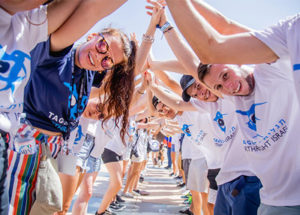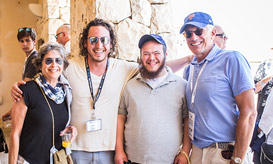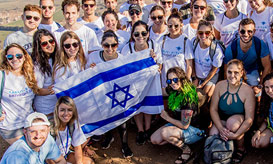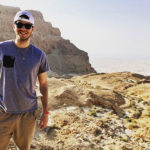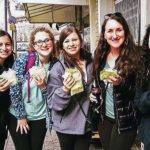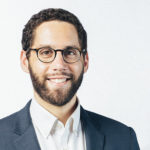You may have heard us say this before: Birthright Israel is strengthening the Jewish future. But…
A year ago, I would have never expected to be writing this blog post here in Israel to discuss the immensely positive impact Birthright Israel has had upon my Jewish identity. My story is unconventional, to say the least, but I feel profoundly fortunate to have ended up where I am today — and that Birthright Israel has left an indelible mark on my Jewish story.
I was born and raised in Las Vegas, Nevada, and attended a Conservative shul, Temple Beth Sholom, throughout my childhood. In my early years, I had always, perhaps unwittingly, worn my Zionism on my sleeve. But not until I was accepted to Princeton University and began to immerse myself in Jewish campus life for the first two years of my college experience did I fully comprehend the interwovenness of my Zionism with my Jewish identity, and the challenges that this pairing would face on the campus green and beyond.
In early 2022, as a second-semester sophomore, I was caught in the crosshairs of a vicious campaign to demonize the world’s only Jewish state. I had just been elected president of Tigers for Israel, Princeton’s pro-Israel student organization, when several students introduced an anti-Israel BDS resolution to the student body. After many difficult months resisting the effort, approaching administrators and encouraging them (unsuccessfully) to take a stand in solidarity with the Jewish community, I finally sank the bill.
But the ordeal tore through the fabric of our Jewish community, leaving a number of us stranded and isolated in the referendum’s aftermath. Since then, the challenges Jewish and pro-Israel students have faced at my university have grown only more ferocious, the response from Jewish leaders on campus more muted, and my participation in Jewish student life, despite my strong sense of Jewish pride, has dwindled as a result.
My story is not unique. The American-Jewish community has reached an impasse: today, American institutions of all stripes, ranging from university campuses to the boardrooms of the country’s most prestigious corporations, have been infected by a new strand of antisemitism — a strand that links itself to the racist Soviet-style propaganda that grew into fashion in the mid-20th century, and that since then has crept into nearly every crevice of the Israel discourse in the Western world.
Many Jews like me find themselves culturally and spiritually homeless, unable to identify with a growing number of movements that are uncertain of how to push back against this particular species of Jew-hatred. Meanwhile, a large swath of American-Jewish culture has been hollowed out by a pervasive fear that to gain entry into today’s mainstream cultural institutions, one must disavow their Jewish heritage and affinity for the State of Israel.
It is precisely for these reasons that Birthright Israel remains an invaluable tool for young Jews to interact with Israel and their Jewish identity. As I was recouping from the BDS campaign at Princeton, I chose to embark on a Birthright Israel trip with a random group of students from a nearby university. I had not been to the Jewish state in nearly a decade, and I was looking forward to re-engaging with the linchpin of my religious identity.
The trip opened my eyes to a Jewish environment that has become increasingly rare in my home country: bright, boisterous, and confident, Israel beckoned me back into the culture to which I had been longing to reconnect. Following this experience, I opted to take some time away from school and intern for a venture capital firm on a Masa program in Israel — which is where I find myself today.
Many Jewish benefactors may feel uneasy giving to Birthright Israel Foundation today as the news cycle churns with tales of an “imperiled” Israeli democracy, American college campuses roiled by waves of BDS resolutions, and diaspora Jews increasingly reluctant to identify with their Jewish faith and the State of Israel. Just as our external threats appear to be at an all-time high, tensions within our community are bubbling to the surface to an extent rarely seen before. But this makes it all the more essential for pro-Israel donors to focus their philanthropic efforts on Birthright Israel — a program rooted in the idea that direct exposure to Israel can strengthen links between diaspora communities and the Jewish state — especially since the organization is facing unprecedented financial constraints.
For those who would rather donate to other causes, particularly non-Jewish ones, I’d like to put out some feelers. For young Jews, Birthright Israel’s classic 10-day trips are not simply about soaking up the hustle and bustle of Tel Aviv, or traversing the bohemian neighborhoods of Haifa, or reveling in the scents and melodies that line the alleyways of Jerusalem and Tzfat. Instead, these journeys are about forming enduring bonds with the Israeli people and embracing the vibrancy of Israeli culture. They deftly reinvigorate participants’ sense of belonging to Am Yisrael. And, perhaps most importantly, they bind together the fringes of the Jewish diaspora in the land where our ancestors roamed, where our covenant was enacted, and where we have practiced our faith with pride and enthusiasm for millennia.
The Birthright Israel experience is, in a word, unparalleled. I encourage you all to give back to Birthright Israel to the greatest extent possible. In doing so, you will be lending an incalculable hand to the Jewish people that will be felt for many years to come.
My name is Jared Stone, and I’m a native of Las Vegas, Nevada. I am a member of Princeton University’s Class of 2025 majoring in politics with minors in history and classics. On campus, I have served as president of Tigers for Israel, the Koach Conservative Jewish minyan, and chaired the Cliosophic conservative political debate society. I play bassoon for one of Princeton’s orchestral groups and participate in the school’s premier interfaith dialogue organization.
Today, I write extensively on issues pertaining to the American-Jewish community and Israel for major international publications and on my Substack, “Kavod.” Outside of my intellectual pursuits, I enjoy hiking, playing tennis, and spending time with my dog, Buster.

